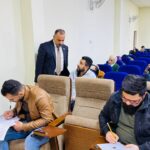
The President of Al-Furat Al-Awsat Technical University Receives the Governor of Najaf Al-Ashraf
Jan 09, 2025

Since ATU university is a public university, the Iraqi national government provides all staff and faculty living wages through higher education and scientific research. The salaries are monthly paid based on standards of Iraqi financial law which are applied to all Iraqi governmental employees. The law also includes subsidy payments, thereby considering the marriage status of the employee and the number of their family member.
On bedsides, employees in the higher education sector with higher qualifications and scientific degrees, including Master, Doctorate, associated professors, professors, and emeritus professors, are awarded a double pay scheme and two months per year leave (fully paid). They are also entitled to one day (off) a week (fully paid), especially for visiting another university or conducting research.
The standard working weekly hours are 35 at a rate of 7 hours per day for five days. However, such hours are lower for employees with higher scientific degrees and titles.
The ministry of higher education and scientific research also provides the university with monthly subsidization mainly used to support its employees financially, students from low income families. Similarly, the ministry provides an annual fund to support the university’s development projects and research activities. In addition, the university has all the rights to seek other fund resources from local governments, non-governmental agencies, and companies for some projects, researches, consultations the university carried out.
The Council of ATU discussed the proposed laws and policies.
3. They discussed the approval of the proposed university law calling for the necessity of rejecting all modern forms of slavery, forced labor, human trafficking, and child labor.
Recommendations
The Board agreed unanimously on the above-proposed policies. Committees with specializations are formed to carry out the proper applications of such policies and integrate

Jan 09, 2025

Jan 08, 2025
